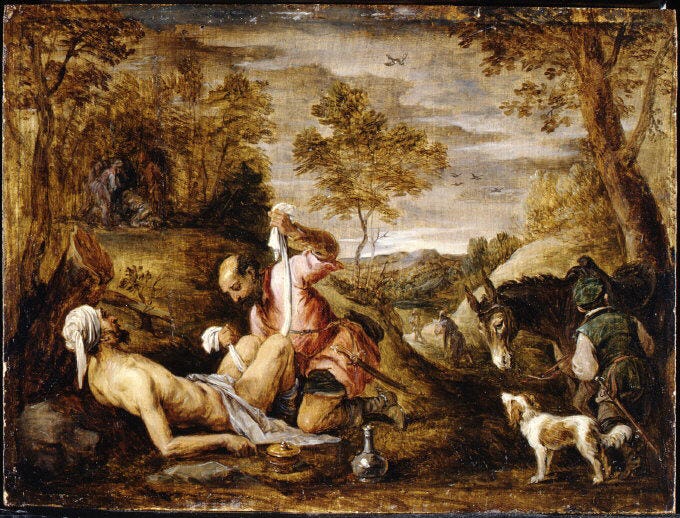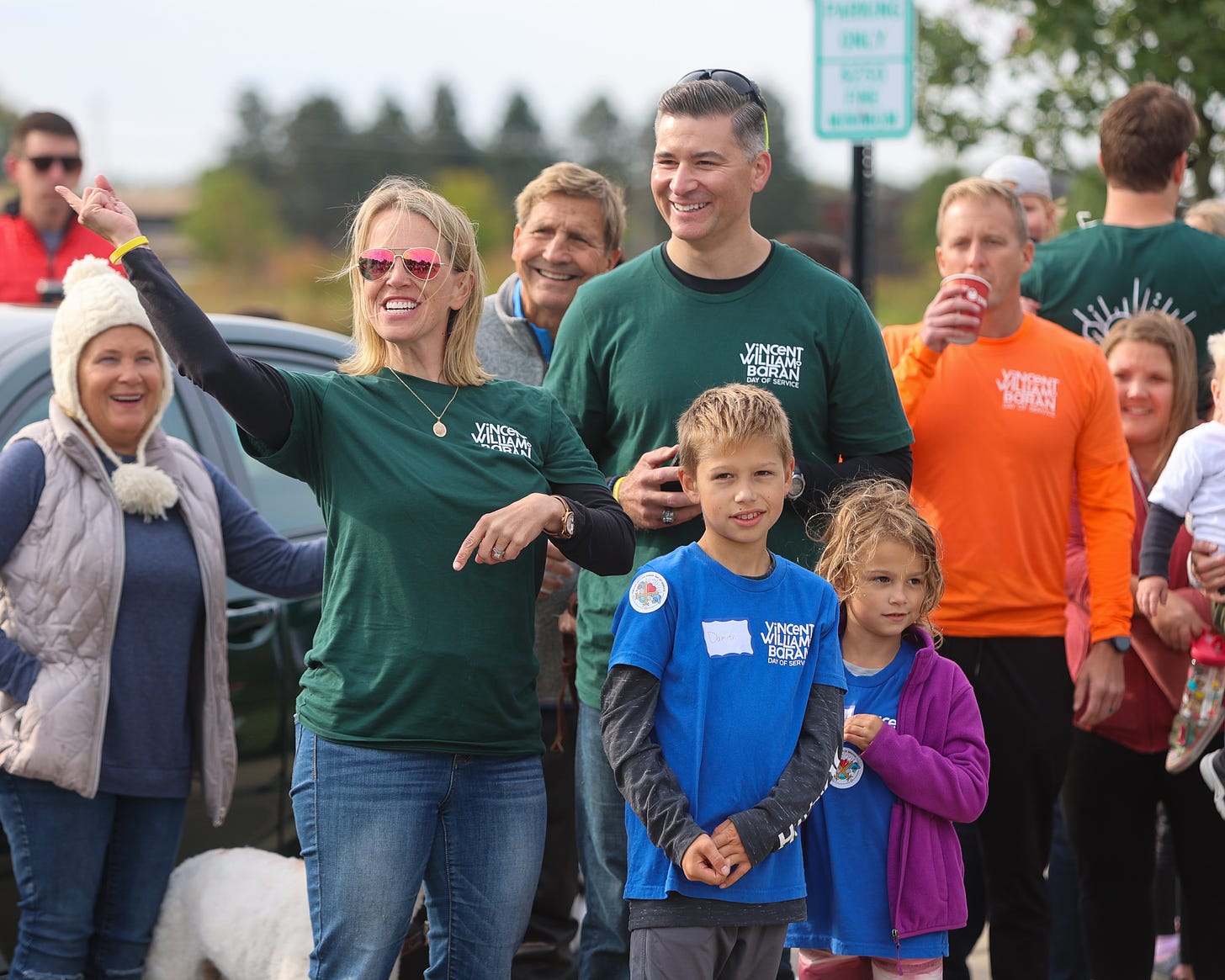Unleashing Love in the Human Person
The true purpose of the Vincent William Baran Day of Service
In 2013, my wife and I named our third child “Vincent” after Saint Vincent de Paul, a 17th-century Catholic priest who dedicated his life to serving the poor. After our son Vincent died in 2020, my wife and I independently had the idea of starting an annual day of service.
We thought this could be a way to honor our son’s memory, but more importantly, we thought it could be a way to facilitate and encourage people to do in-person service projects in their communities—helping the poor and vulnerable like Saint Vincent de Paul.
With the help of a stalwart team of dedicated family members and friends, the inaugural event in September 2021 brought out 303 volunteers who contributed 837 hours of service through in-person service projects in Northeast Ohio. We also collected a variety of types of donations, and we encouraged participation in a walk that raises funds for the Society of Saint Vincent de Paul. About 400 people showed up.
In September 2022, 480 volunteers turned out and performed 1,092 hours of service supporting 24 organizations. And in September 2023, 669 volunteers performed 1,595 hours of service supporting 31 organizations.
Across the three past years, the Vincent William Baran Day of Service has involved 1,452 volunteers who provided 3,524 hours of in-person service. Total donations associated with the day of service have included 1,121 toys and games, 202 pairs of gloves, 552 pairs of boots or shoes, 42 jackets, and 100 toiletry bags for those in need.
Donors also gave $78,000, of which $45,000 went to the nonprofit organizations that participated in the days of service and $33,000 went to the Akron District of the Society of Saint Vincent de Paul for direct support of those in need.
The 4th Annual Vincent William Baran Day of Service is set to occur in a bit of a different way this year, with service projects spread across the days of Sept. 21 to Sept. 27. The culminating community event will be the Friends of the Poor Walk on the morning of Saturday, Sept. 28.
But now that it’s been almost four years since our Vincent died, I think it’s important for some reason to better articulate the true purpose of this effort.
It may surprise some to know that it’s not primarily about our son and his memory.
The Call to Be a Good Samaritan
The Vincent William Baran Day of Service, although bearing the name of our little guy, is primarily about the unleashing of love in the human person by facilitating an intentional time for all of us to practice being the Good Samaritans we're all called to be. If you’re not familiar with the parable of the Good Samaritan, see Luke 10:29-37.
As I’ve written and discussed in a prior essay, Jesus told the parable of a man who fell victim to robbers who beat him and left him for dead. Several passersby, including a priest, failed to stop and help him. A Samaritan traveler not only stopped but also tended to the man’s wounds, took him to an inn, cared for him, and left money with the innkeeper to pay for the man’s continued care and stay. “The Good Samaritan” is a parable that firmly reinforces the virtues of compassion and mercy.

Saint Pope John Paul II explains the parable further in his 1984 apostolic letter Salvifici Doloris, in which he discusses how we can understand human suffering within a Christian context. More specifically, he uses this parable as a description and reminder of how we all should act when we encounter those in adversity. Namely, we should run to them, give of ourselves, and care for them.
In John Paul II’s words:
The parable of the Good Samaritan belongs to the Gospel of suffering. For it indicates what the relationship of each of us must be towards our suffering neighbour. We are not allowed to “pass by on the other side” indifferently; we must “stop” beside him. Everyone who stops beside the suffering of another person, whatever form it may take, is a Good Samaritan. This stopping does not mean curiosity but availability. It is like the opening of a certain interior disposition of the heart, which also has an emotional expression of its own. The name “Good Samaritan” fits every individual who is sensitive to the sufferings of others, who “is moved” by the misfortune of another. If Christ, who knows the interior of man, emphasizes this compassion, this means that it is important for our whole attitude to others’ suffering. Therefore one must cultivate this sensitivity of heart, which bears witness to compassion towards a suffering person. Some times this compassion remains the only or principal expression of our love for and solidarity with the sufferer.
We are called to cultivate compassion, to pay attention, and to help those in need.
According to John Paul II, this is in no uncertain terms required. It is not optional if we are to live an ordered life and find meaning in suffering.
Human Suffering Unleashes Love
John Paul II continues, writing that one way to find meaning in human suffering is through what it can do to those who witness and respond to it.
Again in Salvifici Doloris, he writes:
Following the parable of the Gospel, we could say that suffering, which is present under so many different forms in our human world, is also present in order to unleash love in the human person, that unselfish gift of one's “I” on behalf of other people, especially those who suffer. The world of human suffering unceasingly calls for, so to speak, another world: the world of human love; and in a certain sense man owes to suffering that unselfish love which stirs in his heart and actions. The person who is a “neighbour” cannot indifferently pass by the suffering of another: this in the name of fundamental human solidarity, still more in the name of love of neighbour. He must “stop,” “sympathize,” just like the Samaritan of the Gospel parable. The parable in itself expresses a deeply Christian truth, but one that at the same time is very universally human. It is not without reason that, also in ordinary speech, any activity on behalf of the suffering and needy is called “Good Samaritan” work.
Much like it seems that the existence of much of the world’s adversity gives rise to virtues like courage, I wonder: Without suffering, could there be compassion? At the very least, the presence of suffering does indeed open an opportunity for us to all elevate ourselves through our thoughts and actions.
And so, as I look forward to the 4th Annual Vincent William Baran Day of Service, I’m doing so from the perspective of something that matters far more than our son’s death, as gut-wrenching as that was (and is). My hope is that our efforts make it a bit easier for people to get into the habit of being Good Samaritans, cultivating their own sensitivities for those in need while instilling a sense of service in the next generation.
The in-person service projects we facilitate are located in Northeast Ohio, but we have ways for people to participate from anywhere (here are all the details). I invite you to join in and serve someone in need—not because of me or my family’s tragedy—but because it makes the world a little bit better and because it’s the right thing to do. It’s about creating the type of society that we want by being the type of people we should.
Social science also suggests volunteering boosts your well-being, an outcome I’ve certainly witnessed firsthand these past few years. There are variety of psychological reasons why this happens. But I’d like to think that a big part of it has to do with love—and the way in which service for those in need can unleash that love for our fellow humans, especially those who need it most.
References and for further reading
Click here for full details about the 4th Annual Vincent William Baran Day of Service
“Hundreds take part in service day paying tribute to Hudson boy” - Article in the Akron Beacon Journal about the inaugural Vincent William Baran Day of Service
Salvifici Doloris, an apostolic letter by Saint Pope John Paul II




